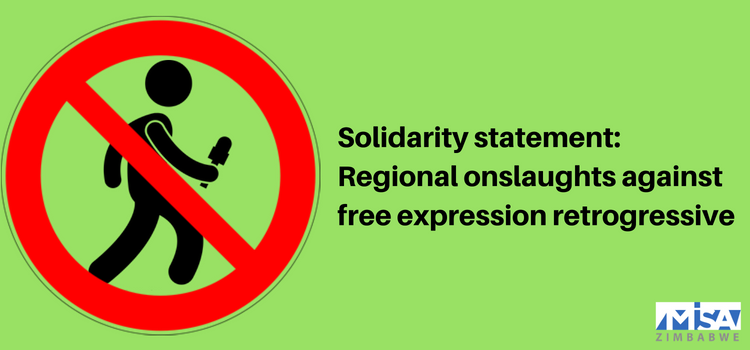MISA Zimbabwe stands in defence and solidarity with media practitioners in Tanzania, Mozambique, and Zambia in the wake of increasing onslaughts against media freedoms and the right to access to information in the three countries.
On Wednesday 8 August 2018, Tanzanian police officers assaulted local sports journalist, Sillas Mbise. The assault took place during a friendly football match at a stadium in Dar es Salaam to commemorate Tanzania’s Simba Day.
Mbise’s assault captured on video, shows him lying on the floor while being attacked by several uniformed police officers. Despite wide circulation of the video, the Dar es Salaam Special Police Commander Lazaro Mambosasa called for an investigation into the matter to establish whether the police were really involved.
Mambosasa also encouraged Mbise to report the matter to the police to “facilitate the investigation.”
These developments are not unique to Tanzania alone as Zimbabwe experienced a rise in the number of attacks on journalists in the week following the 30 July 2018 general elections. Similarly, both countries are yet to make any meaningful arrests or convictions against perpetrators of these violations against journalists.
Meanwhile, Zambia last week intensified efforts to introduce a tax on Internet calls made on Apps such as WhatsApp, Facebook Messenger, and Viber. This comes after the Zambian cabinet approved an executive order that would see the introduction of a 30 ngwee (0.3 kwacha; USD$0.03) daily tariff charged on online phone calls. The tax also affects the use of Internet-based communication services such as Skype.
The Zambian tax is a variant of the Ugandan social media tax introduced on 1 July 2018. However, the Zambian government insists the tax is purely an economic move to protect the country’s telecommunications industry. Demand for fixed-line telecommunications has significantly dropped because consumers prefer cheaper Internet-based applications to communicate.
Other justifications for introducing the tax include curbing the spread of pornography, to fight cyberbullying, and to save local jobs. Notwithstanding these good intentions, the tax is a direct attack on free expression and access to information because it will restrict the number of consumers who are able to access social media Apps and Internet-based communication services.
Last week the Mozambican government announced a hike in media registration fees paid to the Gabinete de Informação, the local government body responsible for media registration. The new tariffs that come into effect on 23 August 2018 are seen as a direct and deliberate attack on independent media in Mozambique.
Foreign correspondents working in Mozambique will be required to pay US$8 630 in accreditation fees, while community radio stations will pay a US$855 licencing tax and an annual tax of US$50. Observers believe these exorbitant fees aim to cripple free media ahead of the country’s elections in 2019.
MISA Zimbabwe condemns these retrogressive actions by African governments to stifle free expression and media freedom.
In the SADC region, these tactics range from physical attacks of journalists and gazetting of laws that discourage citizens from accessing social media Apps and other Internet-based communication services as a means of restricting free expression and access to information critical of the government.
Such legislation and behaviour undermine the principles enshrined in Article 9 of the African Charter on Human and People’s Rights which promotes every person’s right to access information and to free expression.
This also vitiates against the spirit of the Windhoek Declaration on Promoting an Independent and Pluralistic African Press, the Declaration of Principles on Freedom of Expression in Africa and the African Declaration on Internet Rights and Freedoms.
MISA Zimbabwe Regional Solidarity Statement










